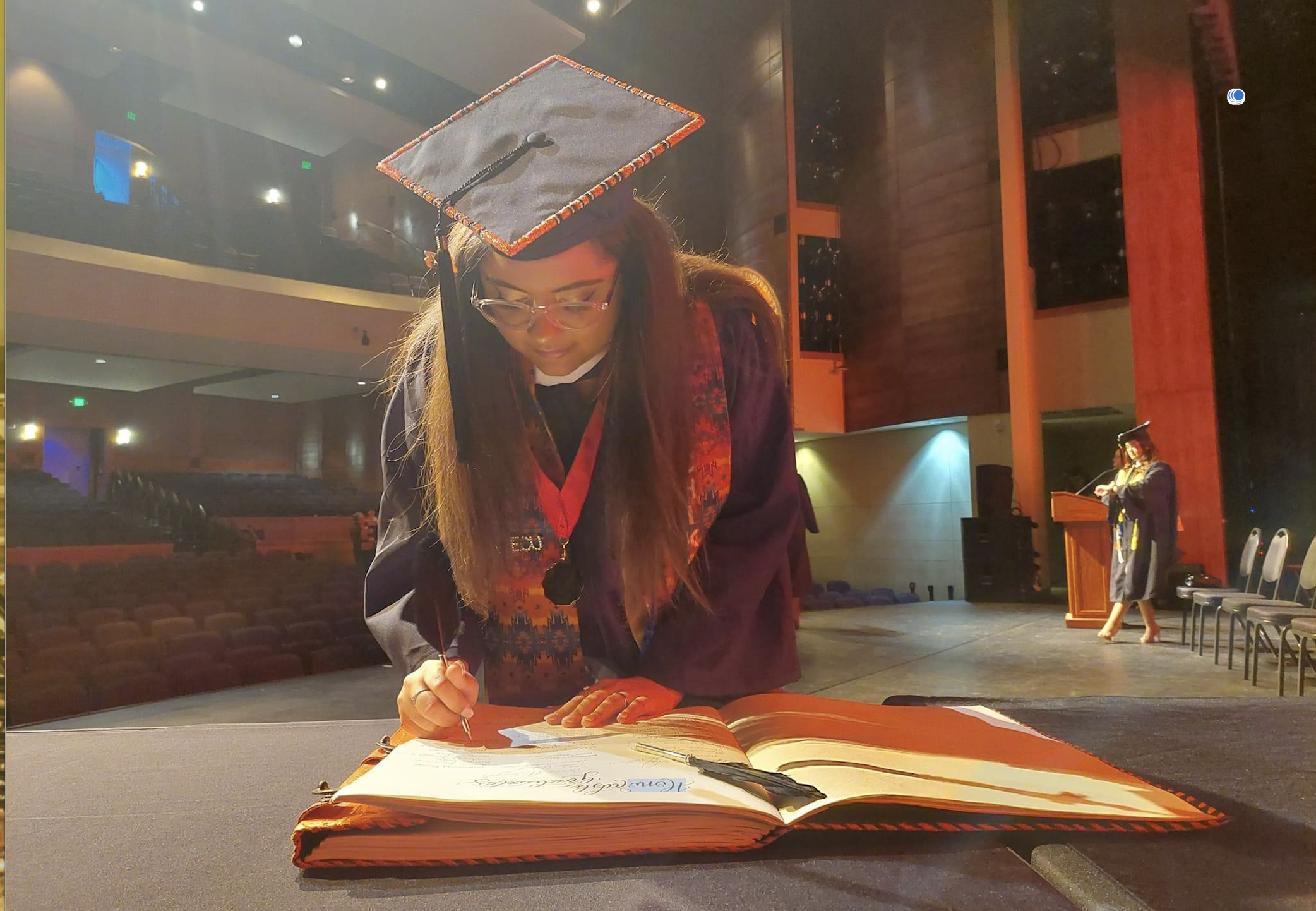
- Details
- By Chickasaw Nation Media
Delanie Seals, East Central University (ECU) graduate and Chickasaw citizen, earned the distinction of being selected as a finalist for this year’s George Nigh Award, an honor bestowed on the school’s top graduating senior.
The George Nigh Award is named after the former governor of Oklahoma and ECU alumnus who also served multiple terms in the Oklahoma House of Representatives and as lieutenant governor of Oklahoma.
Though Seals was not chosen for the top spot, it is an honor to be nominated from a graduating class of more than 320.
Seals earned her Bachelor of Science degree in December 2023 in just three years and is currently working toward a master’s degree in water resource policy management.
Intensity in the classroom is matched by her involvement outside the classroom, not just at ECU, but the surrounding community of Ada, Oklahoma.
She served as president of ECU’s student body and worked to rebuild its governmental structure.
“I started working with the vice president of ECU and a few other students on building the student government back up,” she said. “We worked to rewrite the bylaws, constitution, and student clubs and organization handbook.”
Seals served as the secretary for ECU’s Native American Student Association and as an officer for the Black Student Association her freshman year as well as on the Honors Student Association leadership team.
Off campus, she serves on the city of Ada’s Multiculturalism Committee.
As if those responsibilities were not enough, Seals works for the Chickasaw Nation Office of Natural Resources and with the Udall Foundation.
“I went through the Udall internship program last summer in Washington, D.C., and was able to hire on this semester for a separate program with the National Center for Environmental Conflict Resolution that deals with environmental conflict resolution and Native American natural resources,” she said.
According to its website, the Morris K. Udall and Stewart L. Udall Foundation’s Native American Congressional Internship Program provides Native American and Alaska Native students the opportunity to gain practical experience with the federal legislative process. Its goal is to understand the government-to-government relationship between tribes and the federal government.
“Through the Udall Foundation I worked as an intern for New Mexico Congresswoman Melanie Stansbury. She was a big advocate for Native American water rights policy, and that’s what I worked on.”
The experience sparked her interest in ECU’s graduate water resource policy management degree program.
Seals plans to eventually attend law school to study environmental and Native American law.
She traces her Chickasaw heritage through her father and grandmother.
The lifelong Ada resident said she appreciates the way in which the Chickasaw Nation has helped her.
“I was in the Toksali (to work) SMART (Successful Mindsets with Attitude and Readiness for Tomorrow) workforce training program and the Chikasha Pehlichi Ikbi (Creating Chickasaw Leaders) and am currently in the Chickasaw Nation Recruitment and Retention Program on campus.
“All these programs have shaped me and made me who I am. They provided me opportunities to be able to succeed and get to where I am, whether that be public speaking, networking, with traveling and gaining different experiences,” she said.
More Stories Like This
Bard College Center for Indigenous Studies (CfIS) Hosts Annual Symposium With Keynote Speaker Miranda Belarde-Lewis on March 9–10American Indian College Fund Announces Spring 2026 Faculty Fellow Cohort
Navajo Nation Signs $19 Million Diné Higher Education Grant Fund Act into Law
Dr. Shelly C. Lowe to Be Inaugurated as IAIA President March 26–27
Tlingit Language Courses Expand for Students to Learn With Families At-Home
Help us defend tribal sovereignty.
At Native News Online, our mission is rooted in telling the stories that strengthen sovereignty and uplift Indigenous voices — not just at year’s end, but every single day.
Because of your generosity last year, we were able to keep our reporters on the ground in tribal communities, at national gatherings and in the halls of Congress — covering the issues that matter most to Indian Country: sovereignty, culture, education, health and economic opportunity.
That support sustained us through a tough year in 2025. Now, as we look to the year ahead, we need your help right now to ensure warrior journalism remains strong — reporting that defends tribal sovereignty, amplifies Native truth, and holds power accountable.
 The stakes couldn't be higher. Your support keeps Native voices heard, Native stories told and Native sovereignty defended.
The stakes couldn't be higher. Your support keeps Native voices heard, Native stories told and Native sovereignty defended.
Stand with Warrior Journalism today.
Levi Rickert (Potawatomi), Editor & Publisher

